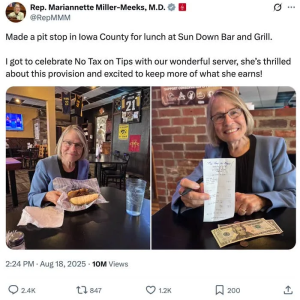
Back in 2017, when Dwayne Johnson appeared on the cover of GQ, our writer Caity Weaver characterized him like this: “For Johnson, there are no strangers; there are simply best friends, and best friends he hasn’t met yet.” So it makes sense that guys often seek him out to ask the big questions on their minds. Questions about mental health and relationships. Questions about workouts and supplements. And, with a quick check over the shoulder to make sure no one is listening too closely, questions about self care and skin care.
“The interaction is always the same when it comes to [asking about my skin routine],” Johnson says. “They start looking around like, ‘Hey, can I ask you: What do you do?’ I wanted to get guys in the space of being comfortable owning our skin care and our self-care because we like to think—we try our best, by the way—to own all these other areas.” Out of those hushed conversations and onto the shelves of Target comes Papatui, a brand-new skin care, hair care, and body care line for men comprising 22 products each priced under $10 that could just as comfortably cost triple and be sold somewhere like Neiman Marcus.
In part, the line is successful because Johnson started from a place that most brands only seem to pick up on years into the game: Personal care products are personal. They are rarely just about fixing a skin ailment or moisturizing our bodies. By inserting his “it’s nice to be important; it’s more important to be nice” brand of hospitality into the line, he’s somehow made the products themselves welcoming and easy-to-use. Like one of the gang. An old friend. A best friend.
As such, every detail has been well cared for—starting with the name. “Tui” comes from a nickname that his Samoan grandfather, High Chief Peter Maivia, gave him as a child. And “Papa” nods to his “favorite role as a father to daughters, and in the Samoan language, it also translates to ‘rock,’” he tells me.
The formulations are well thought out too, starring a who’s who of beauty ingredient heavyweights—including hyaluronic acid, ceramides, niacinamide, salicylic acid—and formulated without parabens, sulfates, dyes, alcohol, or PEGs. Then there are the three signature scents—lush coconut, sandalwood suede, and cedar sport—all creations of Firmenich principal perfumer Frank Voelkl, who famously created the “It fragrance” of the 2010s: Le Labo’s Santal 33.
 10 Things FaZe Rug Can’t Live Without
10 Things FaZe Rug Can’t Live Without
While Johnson loves each of the products, he says his “secret weapon” is the alpha-hydroxy-acid- and witch-hazel-spiked toner. “Emily Blunt is one of my best friends. We were on set, talking about our skin care routines and going back and forth: What’s your exfoliator? What’s your lotion? What’s your morning and night routines? We started laughing and realized we were using many of the same products. Finally, she goes, Well, I gotta ask you: What toner do you use? And I said, ‘I don’t use a toner.’ She looked at me like I kicked my puppy. She sent me the toner that she uses, and I said I’ll give it six weeks. I used it and was blown away, and then I became obsessed. I said: ‘Okay, this feels like a secret weapon for me.’ ”
After testing a number of toners that exfoliate skin and tighten pores, Johnson took his top three to a product chemist and told them to make something that combined the best of each. The chemists warned him the end product might prove too pricey for the line (“This shit is expensive!” Johnson remembers them saying), but he refused to budge. They worked together on the formulation, and it came together for under $10.
Johnson has stories like that for many of the products in the line. The bar soap, for example, has a small window so you can take in the fragrance without opening up the package because, as he tells it, “soap was the thing that always got me, because I’m like, Damn, you can’t open the soap right to smell it right. So I’d be the weirdo to buy, like, 25.” The daily moisturizer is intentionally fragrance-free and has a matte finish to keep you from looking shiny, so that people with sensitive or oily complexions both can reach for it. There’s a deodorant and an antiperspirant. A tattoo balm and stick. And on and on and on.
To Johnson, skin care is an extension of self-care—a fundamental right, not a luxury. And when I ask what self-care practices have made the biggest impact in his life, expecting to hear about macros and protein sources (The Rock has returned to WWE, after all), I start to see why affordability is so intrinsic to the line. He cites a story I wrote about nose breathing, telling me that he’s been trying to incorporate it into his workouts. He tells me that he strongly endorses quiet time and sitting with his thoughts. It seems, to him, that the best things in life are free—and if they’re not, then they shouldn’t cost a whole hell of a lot.
“Clearly, I’m in a different position than I was years ago when I had to stretch it all, but I know what it’s like to go paycheck to paycheck,” he says. “So it’s always been important to make sure that anything I’m lucky enough to create—look, I just wanna make sure that people can afford it. Especially for men in this space where it’s not a space that we’re just used to inhabiting.”
Until, perhaps, now—with a little help from a friend.






